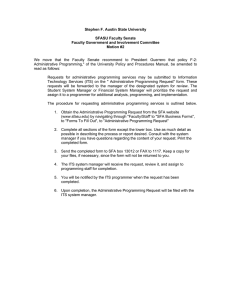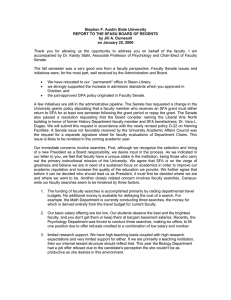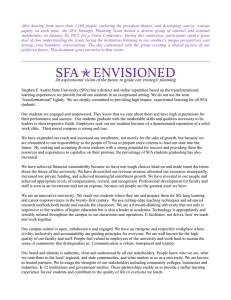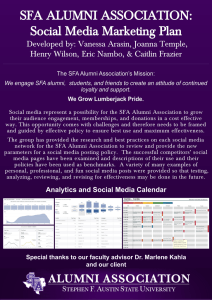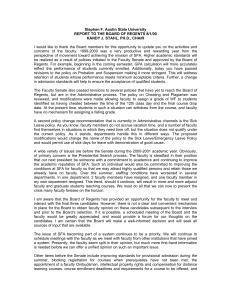Stephen F. Austin State University Faculty Senate Meeting Minutes
advertisement
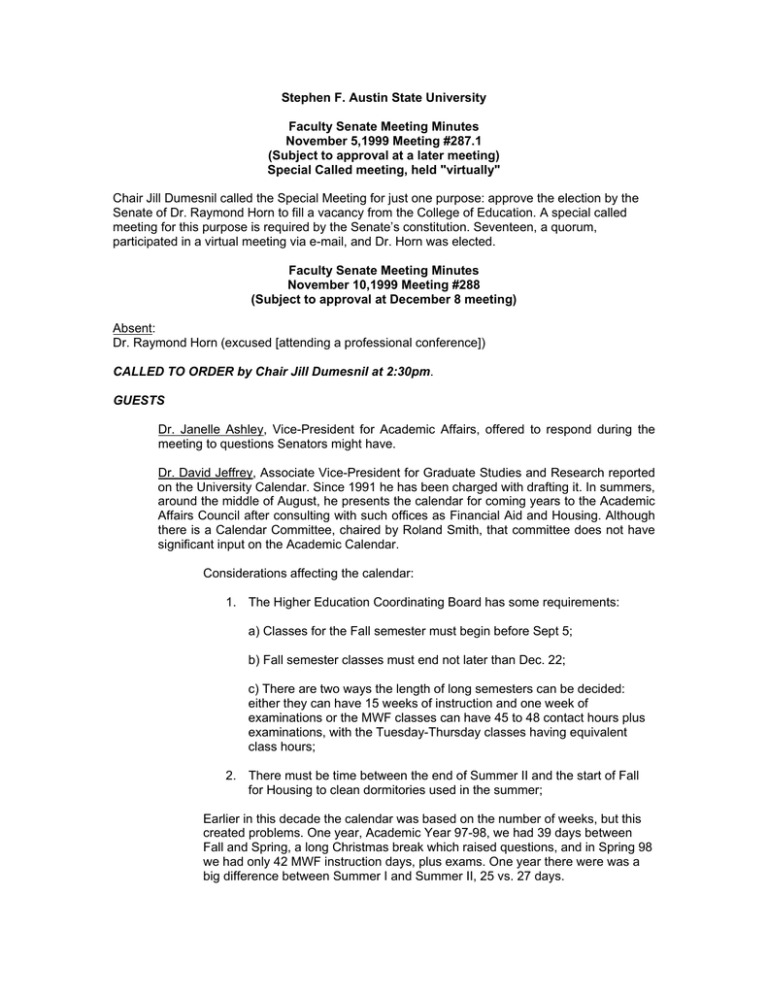
Stephen F. Austin State University Faculty Senate Meeting Minutes November 5,1999 Meeting #287.1 (Subject to approval at a later meeting) Special Called meeting, held "virtually" Chair Jill Dumesnil called the Special Meeting for just one purpose: approve the election by the Senate of Dr. Raymond Horn to fill a vacancy from the College of Education. A special called meeting for this purpose is required by the Senate’s constitution. Seventeen, a quorum, participated in a virtual meeting via e-mail, and Dr. Horn was elected. Faculty Senate Meeting Minutes November 10,1999 Meeting #288 (Subject to approval at December 8 meeting) Absent: Dr. Raymond Horn (excused [attending a professional conference]) CALLED TO ORDER by Chair Jill Dumesnil at 2:30pm. GUESTS Dr. Janelle Ashley, Vice-President for Academic Affairs, offered to respond during the meeting to questions Senators might have. Dr. David Jeffrey, Associate Vice-President for Graduate Studies and Research reported on the University Calendar. Since 1991 he has been charged with drafting it. In summers, around the middle of August, he presents the calendar for coming years to the Academic Affairs Council after consulting with such offices as Financial Aid and Housing. Although there is a Calendar Committee, chaired by Roland Smith, that committee does not have significant input on the Academic Calendar. Considerations affecting the calendar: 1. The Higher Education Coordinating Board has some requirements: a) Classes for the Fall semester must begin before Sept 5; b) Fall semester classes must end not later than Dec. 22; c) There are two ways the length of long semesters can be decided: either they can have 15 weeks of instruction and one week of examinations or the MWF classes can have 45 to 48 contact hours plus examinations, with the Tuesday-Thursday classes having equivalent class hours; 2. There must be time between the end of Summer II and the start of Fall for Housing to clean dormitories used in the summer; Earlier in this decade the calendar was based on the number of weeks, but this created problems. One year, Academic Year 97-98, we had 39 days between Fall and Spring, a long Christmas break which raised questions, and in Spring 98 we had only 42 MWF instruction days, plus exams. One year there were was a big difference between Summer I and Summer II, 25 vs. 27 days. Now Dr. Jeffrey builds the calendar on the basis of instructional days, 45 MWF and 30 TT. Faculty surveyed by Deans Young and Franks in their colleges preferred counting days, not weeks. Dr. Jeffrey answered senators’ questions: Senator Alston noted that Fall commencements in ‘99 and ‘00 come on Dec. 18 and Dec. 16, with first Spring class days on Jan. 12 in ‘00 and Jan. 17 in ‘01. Why the differences? He would prefer more time between Spring and Summer rather than extra time between Fall and Spring. Before the meeting senators had been given a table comparing the schedules of several state universities. Senator Mann asked why the big difference between SFA and Texas A&M’s schedule? Dr. Jeffrey: TAMU must be counting weeks, not days. Senator Sullivan: Since we now have computer registration, which eliminates the several days we formerly devoted to registration, why not start semesters on Tuesdays and have two days, Thursday and Friday, off at Easter? Starting semesters on Wednesdays wastes time in the first week of the semester. Jeffrey: We need two days in the first week with no classes for advising the increasing number of probation students and holding faculty meetings. The Academic Affairs Council wants to end class days on a Friday. To have 45 MWF days and 30 TT days requires starting on Wednesdays. Alston: If in a recent year there was a complaint about 39 days between Fall and Spring, won’t there be complaints about the time between the Dec. 16, 2000 commencement and the Jan. 17, 2001 beginning of classes? Jeffrey: No, because there will only be 31 days. Ballenger: Why bother with a half day on the Wednesday before Thanksgiving? Wednesday afternoon and evening classes are lost Devine: The half-day Wednesday is to protect Tuesday classes. Stahl: Could Dr.Jeffrey consult with the faculty about the calendar? Jeffrey: He would welcome faculty suggestions. This is the second year we have based the calendar upon days; he would like faculty opinion about whether it should be based on 45 instructional days or 15 weeks. Senators discussed alcohol and "Tailgate Alley." Alston asked Vice-President Ashley whether there had been any problems with "Tailgate Alley." Ashley said she was not aware of any, and in response to questions, reminded senators that this subject is not within her area of responsibility. Sullivan said she has two concerns: 1) whether there is underage drinking at the on-campus tailgate parties, and 2) what is SFA’s policy about alcohol on campus. Several senators had questions or opinions about campus alcohol policy. Dumesnil: SFA policy prohibits alcohol in the residence halls but not in campus apartments. Sullivan: What would happen if there was an outdoor student keg party? Students complain that alcohol rules are enforced against students but not others. Ballenger: Policy should be consistent for all. MINUTES for the Oct. 13 meeting were presented for approval with the following corrections: 1. on P. 4, the sentences about graduate assistant stipends should read: "Graduate stipends are to be raised $200 p/a to $6,200 and there will be five more graduate assistants. Because of budget constraints, these changes are less than the Graduate Council recommended last year." 2. on P. 5, line one, insert "with" after "policy"; 3. on P. 5, "Marielon Ratliff" is the correct spelling. Motion to approve: Stahl; Second: Alford; motion carried. ANNOUNCEMENTS: Chair Dumesnil introduced Dr. Elisabeth Hostetter, from the Department of Theatre, a newly elected senator from the College of Fine Arts. Ms. Jennifer Sessions, from the East Texas Blood Center, thanked the Senate and the faculty for supporting the October blood drive. Ninety-three units were donated. Chair Dumesnil introduced Dr. Joseph McWilliams of the Department of Mathematics & Statistics, a member of the university’s Computer and Telecommunications Advisory Committee. Dr. McWilliams reported that SFA is considering a contract with Specialized Computer Technologies (SCT) for new software for our web and network facilities. The software, called "Campus Pipeline," would create a single search site for students and faculty, would provide e-mail, would offer student/faculty chat rooms, and would integrate all existing web facilities. The company has offered us use of "Campus Pipeline" software for free until August 31, 2002. This has been valued at over $220,000. The biggest negative about the proposal is that there would be advertising on some of the sites we use. SFA would have some right to delete advertisers with whom we might have philosophical differences. SFA would have to provide a server and some customizing features. SFA users’ addresses would not be available to outsiders, so we would be protected from inundation with unwanted e- mail ("spam"). Dr. McWilliams’ committee has been told it would take SFA four years to develop software as good as "Campus Pipeline" if we did it ourselves. There was a general discussion of the proposed contract: Dumesnil: Many faculty worry whether advertising and the commercialization that goes with it are appropriate at a university. There will be a demonstration of the software on campus on Friday, Dec. 3. Senator Sementelli, who is on the committee with Dr. McWilliams: SFA has already signed a contract, but it is "nonbinding." McWilliams: SFA has an agreement granting $220,000 worth of software if we seal the bargain, but we can still back out. Scharff: With the proposed software, if one goes to the SFA home page, would one have to go through the "Pipeline" first? McWilliams: Not if one does not wish to. Sementelli: We now have overloads on our network; the SCT system might alleviate that problem. McDonald: When would this contract be locked in? McWilliams: by August. McDonald: Who at SFA will make the final decision? McWilliams: the Vice-President for Fiscal Affairs (subject, of course, to his superiors). Tinsley: Will the $220,000 grant cover maintenance fees? McWilliams: The grant will cover initial maintenance. There is a web site, http://www.sct.com, run by the company, but it is not informative. He had to phone for worthwhile information. OFFICERS’ REPORTS Chair Dumesnil: On the issue of faculty not signing forms evaluating chairs: the Academic Affairs Council has rejected the Senate’s proposal that faculty not be obliged to sign the evaluations. Dr. Dumesnil distributed a memorandum of 10/13/99 from the deans to the VPAA explaining the decision that faculty must continue to sign evaluations. The Board of Regents met Oct. 25-26. One part of the Undergraduate Admissions Standards Committee’s report was accepted. Dr. Dumesnil informed the Regents why the Senate endorsed the Committee’s recommendations. Her report was distributed to the senate. Chair-Elect Stahl: The Senate’s web site is being updated. Dr. Dumesnil’s statement to the Regents is posted on the web site. B. Oswald reported that the Graduate Council has decided that January 18, 2000 is the absolute deadline for final adjustments to theses approved in advance for the Dec., 1999 commencement. Treasurer Alford: There is $4,653 in the Senate account. Secretary Devine: The Texas Council of Faculty Senates met in Austin Oct. 22-23. Because our Chair and Chair-elect had other commitments, he went, and Senator King, who was attending a concurrent meeting of TACT, was also among the delegates from thirty-one state universities. A summary of the meeting: Community colleges not only have succeeded in having the legislature order the transferability of entire core curricula, they have also obtained a legislative mandate that the Higher Education Coordinating Board study the transferability of entire "fields of study," all the courses taken in the first two years of college in a given discipline. In January, advisory committees chosen by the Coordinating Board will begin with Music, General Business, and Interdisciplinary Studies for Elementary Education, and later all other disciplines will be considered. Community colleges are aggressively trying to expand their place in higher education. The legislature seems to think community colleges can do things cheaper than universities. Delegates at our meeting questioned whether university chancellors, presidents, and other administrators have effectively represented universities’ interests in curriculum against junior colleges’ interests. State agencies are very serious about ExCet and about continual recertification of teachers, and they think more teacher education should be done "on site" at the public schools. In a dinner speech, Rep. Garnet Coleman, whose district contains the University of Houston and TSU, said he is committed to making UofH a Carnegie Tier 1 research university. Dr. Devine has a full report of the meeting that he will happily e-mail to anyone who requests it. Senator Sullivan: Today’s Daily Texan has an article on the transferability of courses. Senator King: The TACT meeting stressed the importance of faculty attending the regional meetings to be held by Lieutenant Governor Perry’s committee on higher education. COMMITTEE REPORTS Academic Affairs: For the committee Chair B.Oswald presented a resolution about computing GPAs. Seconded by Dr. Tinsley. The resolution, with the inclusion of a friendly amendment (indicated by quotation marks) from Dr. Starr: Be it Resolved: In an effort to make the grade point average (GPA) more accurately reflect the academic performance of students at Stephen F. Austin State University, the Faculty Senate proposes a change in how SFA calculates the grade points earned from repeated courses. For any course that is repeated once at SFA, the higher of the two grades will be used to determine the GPA. If a course is repeated more than once at SFA, all grades earned for that course will be used to determine the GPA. Credit hours for courses taken at other institutions to replace credit hours earned at SFA may be used to meet graduation credit hours requirements, but grades from transferred courses will not change the GPA based on courses taken at SFA. Only grades earned at SFA, and all grades earned at SFA (except "the lower of two" grades for courses repeated just once at SFA) will be used for calculating GPA. This policy should become active beginning the fall 2001 semester. Students enrolled at SFA prior to that time have the option of following this policy or the policy in effect when they enrolled. Senators discussed at length the complexities involved in calculating the GPA. Alston: Some perfect "4.0"’s are bogus if students have replaced lower grades with "A"’s. Stahl: Some students will repeat courses, never intending to go to class, just to have the twelve hours required for financial aid. Ballenger: Does state law or SFA policy let faculty drop a student from the class roll? VP Ashley: Because of insurance and financial considerations we are reluctant to drop a student for absences. Sullivan: There is no policy authorizing dropping a student, and therefore we cannot. Dumesnil agreed. Sullivan: The resolution is not precise enough. Dumesnil: This resolution requests a policy. It does not have to form the policy precisely. Presently there is no policy about computing GPA; we do it in a traditional way without any policy or defined procedure. B.Oswald: The resolution is a compromise. Some faculty would like all courses to be counted. Scharff: Why not just drop the first grade all the time and then count all additional courses. Tinsley: Responsible use of university resources requires tightening up how we figure the GPA. McCune moved, and Sullivan seconded, an amendment to the resolution: if there are three or more attempts at a course, count the higher of the first two attempts and average in all subsequent attempts. Stahl spoke against the amendment. Abel: favored counting all courses. McDonald: It would be fair to count all grades. The vote on the amendment: 5 aye; 13 no; 1 abstention. The amendment failed. The vote on the resolution (including Starr’s friendly amendment): 16 aye, 3 no. The resolution was approved. Chair Dumesnil will send it to the VPAA. Elections: Dr. Greer reported that in a virtual meeting Dr. Raymond Horn of the Department of Secondary Education and Educational Leadership was elected to represent the College of Education. Seventeen senators participated in the virtual meeting. Faculty Government And Involvement: Dr. Burt: The committee is conducting a survey about safety. Dr. Sementelli surveyed 200 students. There are worries about inadequate lighting because of burned out bulbs and about the availability of campus escorts. Professional Welfare: Senator T. Oswald presented, as a first reading, an addition to Policy A-39 about grant recipients who do not return after a summer grant. The addition would be inserted after Paragraph 10 and would read as follows: 10 a. The recipient of a faculty research grant must guarantee the University that he/she will return to his/her regular duties for a full semester immediately following the expiration of the grant, provided that he/she is offered a contract by the University. If the recipient does not wish to return to the employment of the University, then the amount of the grant must be paid back in full. Dr. Sullivan: Shouldn’t a date be included? Strategic Planning: Chair-Elect. Stahl: The committee is studying the systems question. Senators are asked to poll their faculty about it. McCune: At schools which have been added to systems, did their faculties request it? King: At Lamar the faculty senate did initiate going into a system. He did not recall whether Lamar’s faculty had been asked about a specific system. Tinsley: A poll should use a standard form. Stahl: The committee will send senators a polling form. OLD BUSINESS Dr. Sharff distributed to the Senate a proposal written by some of her colleagues in reaction to the Academic Affairs Council’s rejection of the Senate’s proposal for anonymous evaluations of chairs by faculty. Her colleagues propose that student evaluations of faculty be signed because to judge the validity of a student’s evaluation one needs to know who the student is and what the student’s qualifications are. The proposal is facetious, but the arguments used are the same used by the deans to defend signed faculty evaluations. Anybody who sees the objections to requiring students to sign their evaluations should see that the same objections hold against signed faculty evaluations. Tinsley and Ballenger: To pretend that we advocate signed student evaluations would be to pursue a protest so subtly ironic it might be understood. T.Oswald: Repass our policy. Scharff: We need to point out the inconsistency of students’ not signing but faculty signing evaluations. And requiring signatures stifles constructive, valid criticism. Tinsley: The administration could easily argue that the judgments of students and faculty are different and should not be placed on the same level. He opposed the facetious petition. Sementelli: Student and faculty evaluations are treated as equally valid by the administration. Abel: The deans’ memo to Dr. Ashley has ad hominem arguments in clauses #1 and 2. Sullivan: Let the Professional Welfare Committee resume work on this and recreate a petition. Dumesnil: The sense of the Senate is to return the question of unsigned faculty evaluations to the Professional Welfare Committee. No action will be taken today on the petition about student evaluations. NEW BUSINESS Dr. Devine asked when there would be a search committee for a new Liberal Arts dean. VP Ashley: There has been a delay while she tried to gauge whether there is desire to have a single dean for Liberal Arts and Science and Mathematics as has been suggested by the present dean of Liberal Arts, Dr. Speer. She has not seen any sentiment for a marriage of the two colleges. A search committee will soon be formed. Several senators agreed they have not seen any faculty demand for a single dean. Dr. Devine moved, and Dr. Alford seconded, that the Senate ask the administration to name the Liberal Arts North Building in honor of Dr. Vera L. Dugas, formerly a long time member of the History Department faculty. Dr. Dugas, who died in May, willed three and a half million dollars to the SFA Alumni Association to be used for scholarships. The motion passed on a voice vote. Chair Dumesnil agreed to make the request. VP Ashley noted that naming buildings is a prerogative of the Board of Regents. ADJOURNED: 5:00p.m. Respectfully submitted, Joe Devine, Secretary
